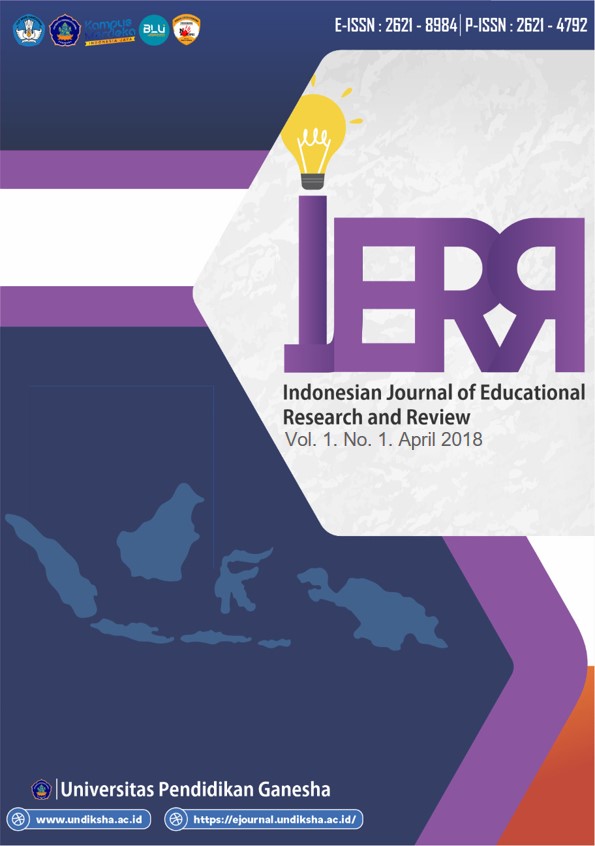PENGARUH MODEL STUDENT FACILITATOR AND EXPLAINING BERBANTUAN MEDIA VISUAL NON PROYEKSI TERHADAP KOMPETENSI PENGETAHUAN IPA
DOI:
https://doi.org/10.23887/ijerr.v1i1.14616Abstract
This study aims to determine the influence and the effect size of student facilitator and explaining learning model, assisted by non-projection visual media toward the science knowledge competences of fourth grade students at SD Gugus Letda Made Putra North Denpasar 2017/2018 academic year. The type of this research is quasi experimental with non-equivalent control group design. The population of this research was 11 group classes of fourth grade students at SD Gugus Letda Made Putra North Denpasar which amount to 393 students. The sampling technique used in this research is the group sample technique. The sample of this study was consist of 2 groups; experimental group and control group. Each group was given a pre-test and then measured by using the t-test to determine its equality. The data of science knowledge competences were obtained through a test of multiple choice questions. After obtaining the post-test data of science knowledge competences, the data were analyzed by using t-test with polled variance formula. The average post-test score of the students in the experimental group is 75,37 and the average student in the control group is 68,25. Based on the 5% of significance level and the dk = 71, the result obtains the tcount = 2,147 > ttable = 1,994. Thus, there is a significant difference of science knowledge competences between the experimental group and the control group. It can be concluded that student facilitator and explaining learning model assisted by non-projection visual media has a significant influence toward science knowledge competences of fourth grade students at SD Gugus Letda Made Putra Nort Denpasar 2017/2018 academic year. The calculation of the effect size model to science knowledge competences is done by calculating the Cohen's d Coefficient, which obtains value d = 0,51 with medium effect category.References
Agung, A. A. G. 2014. Buku Ajar Metodologi Penelitian Pendidikan. Yogyakarta: Aditya Media Publishing.
Arifin, Zainal. 2014. Evaluasi Pembelajaran. Bandung: PT Remaja Rosdakarya Offset.
Arikunto, Suharsimi. 2015. Dasar-Dasar Evaluasi Pendidikan. Jakarta: Bumi Aksara.
Dantes, N. 2017. Desain Eksperimen dan Analisis Data. Depok: Rajawali Pers.
Gravetter, Frederick J dan Larry B. Wallnau. 2014. Essentials of Statistics for the Behavioral Sciences. Eight Edition. Belmont, CA: Wadsworth.
Hamalik, Oemar. 2014. Kurikulum dan Pembelajaran. Jakarta: Bumi Aksara.
Kosasih, E. 2014. Strategi Belajar dan Pembelajaran Implementasi Kurikulum 2013. Bandung: Yrama Widya.
Kurniasih, Imas dan Berlin Sani. 2015. Ragam Pengembangan Model Pembelajaran untuk Peningkatan Profesionalitas Guru. Yogyakarta: Kata Pena.
Musfiqon, 2012.Pengembangan Media dan Sumber Pembelajaran. Jakarta: PT. Prestasi Pustakarya.
Samatowa, Usman. 2016. Pembelajaran IPA di Sekolah Dasar. Jakarta: PT. Indeks.
Setyosari, Punaji. 2015. Metode Penelitian Pendidikan dan Pengembangan. Jakarta: Prenadamedia Group.
Shoimin, Aris. 2014. 68 Model Pembelajaran Inovatif dalam Kurikulum 2013. Yogyakarta: Ar-ruzz Media.
Susanto, Ahmad. 2013. Teori Belajar dan pembelajaran di Sekolah Dasar. Jakarta: Prenadamedia Group.
Wati, Ega Rima. 2016. Ragam Media Pembelajaran Visual - Audio Visual - Komputer-Power Point-Internet-Interactive Video. Yogyakarta: Kata Pena.
Wisudawati, Asih Widi dan Eka Sulistyowati. 2014. Metodologi Pembelajaran IPA. Jakarta: Bumi Aksara.
Yusuf, Muri. A. 2015. Asesmen dan Evaluasi Pendidikan Pilar Penyedia Informasi dan Kegiatan pengendalian Mutu Pendidikan. Jakarta: Prenadamedia Group.
Kumaidi. 2005. Pengukuran Bekal Awal Belajar dan Pengembangan Tesnya. Jurnal Ilmu Pendidikan. Jilid 5, No. 4,
Kuntoro, T. 2006. Pengembangan Kurikulum Pelatihan Magang di STM Nasional Semarang: Suatu Studi Berdasarkan Dunia Usaha. Tesis tidak diterbitkan. Semarang: PPS UNNES
Pitunov, B. 13 Desember 2007. Sekolah Unggulan Ataukah Sekolah Pengunggulan ? Majapahit Pos, hlm. 4 & 11
Waseso, M.G. 2001. Isi dan Format Jurnal Ilmiah. Makalah disajikan dalam Seminar Lokakarya Penulisan artikel dan Pengelolaan jurnal Ilmiah, Universitas Lambungmangkurat, 9-11Agustus
Downloads
Published
How to Cite
Issue
Section
License
Authors who publish with the Indonesian Journal of Educational Research and Review (IJERR) agree to the following terms:
- Authors retain copyright and grant the journal the right of first publication with the work simultaneously licensed under a Creative Commons Attribution-ShareAlike 4.0 International License. that allows others to share the work with an acknowledgment of the work's authorship and initial publication in this journal.
- Authors are able to enter into separate, additional contractual arrangements for the non-exclusive distribution of the journal's published version of the work (e.g., post it to an institutional repository or publish it in a book), with an acknowledgment of its initial publication in this journal.
- Authors are permitted and encouraged to post their work online (e.g., in institutional repositories or on their website) prior to and during the submission process, as it can lead to productive exchanges, as well as earlier and greater citation of published work. (See The Effect of Open Access)









